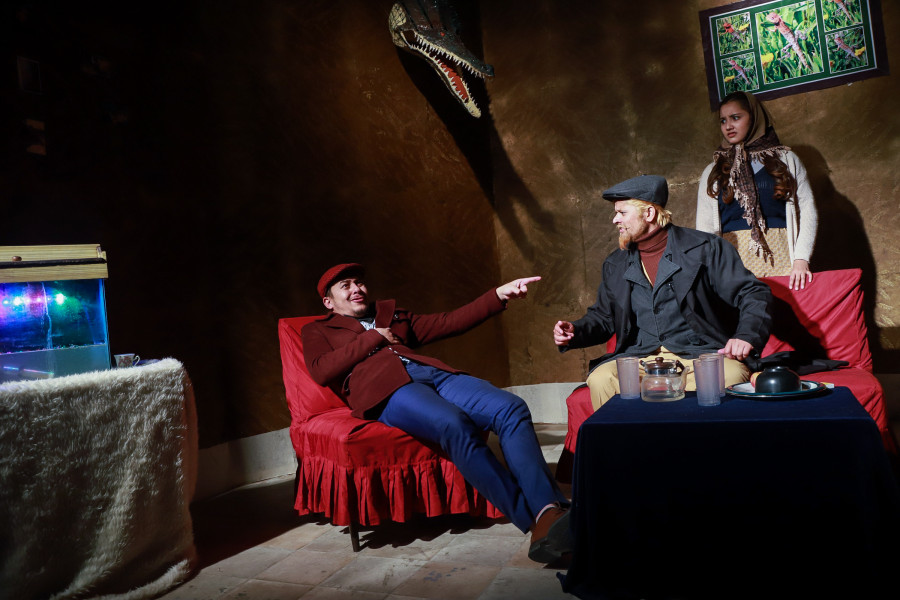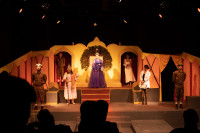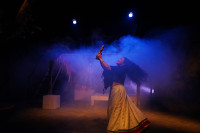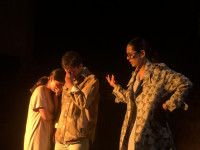Theater
Strong acting but poor production lets down a timeless classic
Shailee Theatre’s ‘Bibhaha ko Prastab’ plays on an interesting narrative about marriage.
Shashwat Pant
Stepan Stepanovitch Chubukov is worried his daughter Nataliya Stepanovna is still single, and it’s a thought that keeps him up at night. To fix her wedding, Stephanovitch calls his friends (and enemies) to ask for suggestions, but nothing goes as planned. Things get even more interesting when Stepanovitch’s neighbour Ivan Vassiliyitch Lomov enters the fray, asking for Nayaliya’s hand. But, once again, things don’t go as planned.
Directed by Navaraj Budathoki and produced by Shailee Theatre, in association with the Russian Culture Centre, Bibhaha ko Prastab is a one-act play adapted from Russian writer Anton Chekhov’s 1889 work A Marriage Proposal.
In the play, Chekov has satirised marriage conventions of land-owning aristocrats of Russia in the 19th century. Budathoki’s Nepali version is a loyal adaption of the original, following the same narrative of showcasing how people have misplaced ideas when it comes to courtship. Rather than for love or partnership, people are drawn towards the idea of marriage to improve their financial status or social standing. Although Chekov wrote the play two centuries ago, this idea of marriage is still relevant in Nepali society.
But in their bid to stay loyal to the original play, the director kept the Russian names of the characters rather than translating them to Nepali monikers—something typically done to help the audience relate to the characters. The director’s choice to keep the Russian names is debatable, given the actors have done everything to bring life to Chekov’s characters. Perhaps changing the names could have helped the protagonists be more relatable to the audience.
Subash Subedi, who plays the role of Stepanovitch, has nailed his part. Everything from his look to delivery of dialogue is spot on. Playing the role of a worried father, Subedi holds the play together.
Shashank Bohora, as Ivan Vassiliyitch, is equally good with what was offered to him. His expressions are quite unique, and leaves the audience engaged. From his introduction, he manages to grab the audience’s attention—given that his part is that of a nervous, timid suitor. That leaves the audience dumbstruck when he actually starts to speak. That said, there are parts where he overdoes it, but that might not be just on him but also on the director and his vision. But his chemistry with both Subedi and Sneha Poudel, who plays the role of Nataliya, is worth applauding.
Poudel is flawless. Her acting is natural and to the point. Her delivery is commanding, especially during arguments with Ivan Vassiliyitch—a major part of the play itself. The fact that they seemed like an actual couple fighting was what makes the actors’ commitment more palpable. In one scene, where she stuffs an apple into Vassiliyitch’s mouth to stop him from talking is funny yet relatable.
All the actors in the play, except for some of those playing smaller roles, who were clearly overacting, did a fair job. The director definitely had a line up of deft actors, but in the end, the production let him and the actors down. The set design, including the lighting, is mediocre at best. The light engineer seems to have tried to set the tone, but he seems to lack both experience and equipment. Same is the case with sound—it seems disjointed as well as out of sync with the actors at times.
The wider team, however, did put in a lot of effort and hard work. This can be exemplified by the props, the most notable being the use of masks. They effortlessly signified the two-faced nature of the characters, adding depth to the possibilities of how each protagonist can act or react in certain situations.
But at the same time, it is baffling to see that the production team didn’t put the same amount of work when it comes to the actors’ appearance. The makeup and costume of the cast was inconsistent to say the least. Apart from Subedi, who sports a beard and brown hair, and wears an overcoat, no one looks Russian—if that was what they were aiming for, which isn’t clear either. The men are wearing suits like they’re attending a wedding while Poudel, who says she came from the fields, doesn’t look like it at all.
The length of the play also does not seem to be in its favour. Some scenes between Poudel and Bohora could have been a bit shorter, or other topics could have been incorporated, to make it a bit relevant to the Nepali context.
Overall, the play is entertaining. It makes you laugh, it makes you emotional, and it leaves you wondering if marriage is worth it at all. The flaws of the play can be ignored, as the theatre is quite new, but only with hope it improves in the future. That said, the work of the actors cannot be undermined.
The play is being staged at Shailee Theatre, Ratopul, until January 24 at 4:50 pm every day except Wednesdays.




 9.89°C Kathmandu
9.89°C Kathmandu










